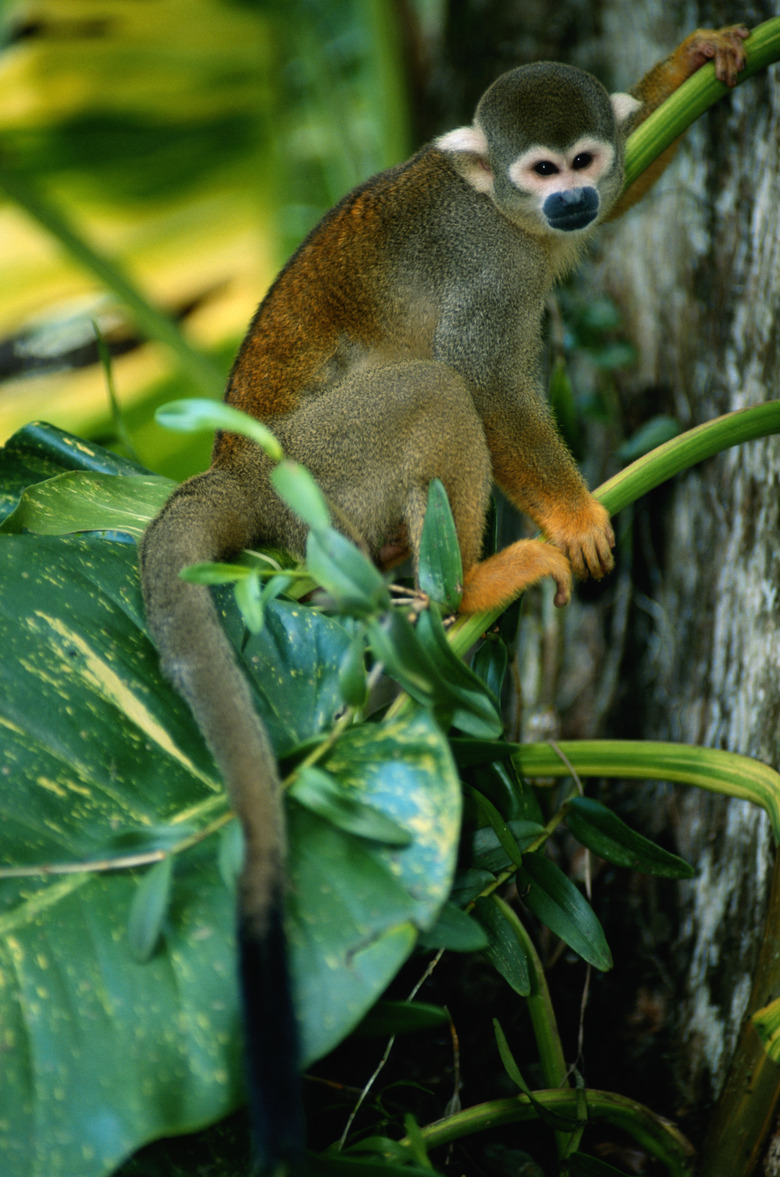What Is The Haploid & Diploid Cell Number For A Monkey?
When cells divide, DNA must divide with them. That would be very difficult to do if over 40 delicate and long DNA molecules were tangled. To avoid this problem, DNA is kept organized by coiling tightly around proteins until forming structures called chromosomes. Sexually reproducing organisms, such as monkeys, have two copies of every chromosome: one from the mother, and one from the father. However, not all monkeys have the same number of chromosomes. The diploid chromosome number of a monkey will depend on its haploid number, and its haploid number will depend on the species.
Haploid and Diploid Chromosome Number
Haploid and Diploid Chromosome Number
Haploid number is the number of chromosomes in a sex cell, such as a sperm or an egg. It is abbreviated as n. Diploid number is the number of chromosomes in a non-sex cell, such as the zygote that results from a sperm cell fertilizing an egg. It is abbreviated as 2n. The diploid number of an organism will be double the haploid number, since it results from receiving one haploid set of chromosomes from each parent. Humans have a diploid number of 46 (2n = 46), meaning human sex cells have a haploid number of 23 (n = 23). Other primates, such as monkeys, may have different haploid and diploid numbers, which vary by species.
Monkeys with Less Chromosomes than Humans
Monkeys with Less Chromosomes than Humans
Rhesus monkeys and it's close relatives in the genus Macaca have a diploid number of 42 and a haploid number of 21. Several spider monkeys also share chromosome numbers, with black-faces spider monkeys, hooded spider monkeys, and golden spider monkeys, all in the genus Ateles, having a diploid number of 34 and a haploid number of 17. Squirrel monkeys have a diploid number of 44 and, therefore, a haploid number of 22. Some monkeys have the same number of chromosomes as humans including silky marmosets, red-tailed tamarins, red titis, red uakaris, and saki monkeys.
Monkeys with More Chromosomes Than Humans
Monkeys with More Chromosomes Than Humans
Capuchin ringtails and patas monkeys both have a diploid number of 54 and a haploid number of 27. Green monkeys and Diana monkeys both have a diploid number of 60 and a haploid number of 30. The diploid number in brown woolly monkeys is 64, due to a haploid number of 32. Some Old World monkeys have even more chromosomes than that, including the Diadem guenon, with a diploid number of 72. That's more than three times the haploid number of a human.
Chromosome Number in Other Primates
Chromosome Number in Other Primates
Other primates, such as gibbons, lorises, and our closest relatives, the Great apes, also have varying chromosome numbers. The Great apes — orangutans, chimpanzees and gorillas — all have one additional set of chromosomes compared to humans, with a diploid number of 48 and a haploid number of 24. After the chimpanzee genome was sequenced in 2005, research comparing chromosomes has shown evidence that Chromosome 2 in humans resulted from the fusion of two chromosomes in a common ancestor with the Great apes. This research on chromosome numbers was used as evidence during the Dover creationism trial in 2005, arguing against the teaching of intelligent design in public schools.
References
- Discover: The Loom – The Mystery of the Missing Chromosome (With A Special Guest Appearance from Facebook Creationists)
Cite This Article
MLA
Meister, Deborah. "What Is The Haploid & Diploid Cell Number For A Monkey?" sciencing.com, https://www.sciencing.com/what-is-the-haploid-diploid-cell-number-for-a-monkey-12732203/. 12 March 2014.
APA
Meister, Deborah. (2014, March 12). What Is The Haploid & Diploid Cell Number For A Monkey?. sciencing.com. Retrieved from https://www.sciencing.com/what-is-the-haploid-diploid-cell-number-for-a-monkey-12732203/
Chicago
Meister, Deborah. What Is The Haploid & Diploid Cell Number For A Monkey? last modified March 24, 2022. https://www.sciencing.com/what-is-the-haploid-diploid-cell-number-for-a-monkey-12732203/
